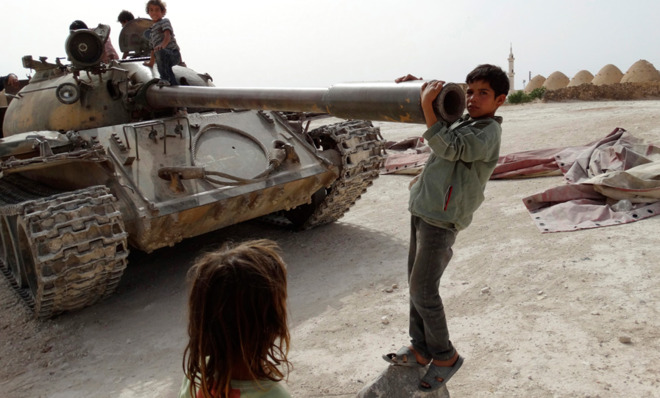The trauma-filled tragedy of Syria's child refugees
The war-ravaged nation's youngest generation will be unequipped to rebuild Syria when the conflict finally concludes


A free daily email with the biggest news stories of the day – and the best features from TheWeek.com
You are now subscribed
Your newsletter sign-up was successful
The Syrian civil war has now created more than 3 million refugees, the United Nations reported last week. (If anything, that tally is too low, as the U.N. only counts people who have officially registered as refugees.) U.N. officials are now calling this "the biggest humanitarian emergency of our era."
Jordan has taken in 608,000 Syrian refugees, Turkey has 815,000, and Lebanon has accepted approximately 1.1 million, according to the U.N. Many have also escaped to Iraq, Egypt, and other countries across the Middle East. But hidden beneath this mammoth figure lies an even sadder story: More than half of these refugees are children. That is a startling tragedy. An entire generation of Syrian children have been brutalized by violence, driven from their homes, and forced to bear the weight of a war they did not start.
While interviewing refugees in Jordanian camps and Lebanese tent settlements last month, I was struck by the psychosocial trauma these kids have endured. When I asked children what they remember of Syria, they almost always spoke of war and death.
The Week
Escape your echo chamber. Get the facts behind the news, plus analysis from multiple perspectives.

Sign up for The Week's Free Newsletters
From our morning news briefing to a weekly Good News Newsletter, get the best of The Week delivered directly to your inbox.
From our morning news briefing to a weekly Good News Newsletter, get the best of The Week delivered directly to your inbox.
Thirteen-year-old Mohamed, for example, told me a story of playing outside when a rebel sniper shot his nephew in the head. When his uncle rushed to the body, the sniper shot him in the face, killing him too. A Syrian military tank later ran over both corpses. The fearful community was forced to watch them rot from a distance. Mohamed couldn't make eye contact with me when we spoke, and refused to talk to me unless three friends were present.
Mohamed is one of more than 200 children enrolled in an education program at a Child Friendly Space (CFS) near Jordan's infamous Zaatari refugee camp. One of the program's facilitators, Sarah Sarhan, schedules time for her class of 4- to 12-year-olds to talk. The mostly introverted kids open up and speak of bombing, corpses, torture, and people who lost limbs. It is the most gruesome story time imaginable.
Aid workers with similar programs across the region say this level of distress among refugee children is not unusual. Joelle Wakin, a CFS coordinator in the Bekaa region of Lebanon, told me roughly 70 percent of the children in her programs witnessed some kind of violence before leaving Syria.
Three-year-old Suheib hasn't spoken a word since arriving at a shelter in Taanayil, Lebanon. Every time a plane flies overhead, he runs uncontrollably in terrified circles. His 7-year-old brother, Hamza, suffers from night terrors. Their mother told me that Hamza's response to the violence he witnessed in Syria confounds her: "He would laugh and cry at the same time while shivering."
A free daily email with the biggest news stories of the day – and the best features from TheWeek.com
These children are showing signs of deep psychological trauma: PTSD, shyness, anxiety, agitation, speech impediments, and even more startling symptoms. Bernadette Hajj, a psychologist working in a Bekaa CFS, says all of the 171 Syrian refugee children under her care show signs of social dysfunction.
"Most either shrink back when you reach to touch them or stay glued to you because they need affection," Hajj says.
In addition to psychological trauma, many displaced Syrian children experienced physical trauma, including rampant child labor, recruitment by armed groups, and early marriage for young girls. In Lebanon, I spoke to a family who married off their 14-year-old daughter to a 22-year-old man she'd never met. Another family was considering marrying their 13-year-old daughter to a 45-year-old man because they could barely afford to feed her.
A 2014 report by World Vision, one of the humanitarian groups working in the region, found that 86 percent of the 140 Syrian refugee children (ages 10 to 17) included in the study said that their peers had been exposed to violence within their new communities. Hajj estimates that most of the children under her care have experienced violence at home. She recounted a story of one child who was hung by his legs in the bathroom for hours whenever he got into trouble.
But perhaps the greatest and most lasting impact of the Syrian civil war on children is the threat to education. Those who have chosen to stay in Syria now face a situation where one in five schools has been destroyed. The remaining educational system has been stretched to a breaking point. The Syrian Ministry of Education reports that it has lost 22 percent of its teachers and 18 percent of school counselors.
Those who fled to neighboring countries face even greater educational hurdles. Public school systems in countries like Egypt or Iraq are often poorly equipped and overpopulated. The schools nearest refugee settlements are often full. Children lack transportation to access even those schools that can receive them. As a result, 56 percent of registered Syrian refugee children in Jordan and 80 percent in Lebanon are not enrolled in school.
Of course, once you get children into school there's the formidable task of keeping them there. Syrian kids often encounter language barriers in foreign school systems. They struggle to grasp the dialect in Egypt, for example, and can't understand the French or English curriculum components in Lebanon. Additionally, many children report being bullied by peers. The Syrian dropout rate can be twice the national average in some host countries.
As years roll on, the chances that many of these children will ever go back to school decreases. After three or four years, the gap between age and education level becomes insurmountable. Many Arab countries lack sufficient remedial programs to catch students up, and the law often prohibits kids who have been out of school for a certain period from re-enrolling.
While Syria's neighboring nations have been generous to open their borders and receive so many refugees, these governments are now overwhelmed by the needs of so many. Humanitarian and aid organizations in the region can help provide many of the services needed to house, feed, and provide psychosocial therapy to these refugees. But much of the rest of the world seems unaware or uninterested. As I spoke with aid workers, many vented their frustrations.
"We're letting this happen," Meg Sattler, communications director for the Syrian Response for World Vision, told me. "The world is turning its back on Syria and these children because it's too complicated politically and religiously and there's just not enough interest. But these children are suffering the effects of us ignoring this."
She's right. When woven together, these three problematic strands — physical, psychological, and educational — become a noose around the neck of Syria's future. This conflict is creating a generation of Syrians who are uneducated, traumatized, and ill-equipped to succeed in modern society. When this conflict ends, the displaced children of Syria will return to their country without the resources to rebuild it.
If people of goodwill and means let such a future materialize, we dare not blame ISIS or Assad or Obama for it all. We too will be culpable.
Jonathan Merritt is author of the book Learning to Speak God from Scratch: Why Sacred Words are Vanishing — and How We Can Revive Them and a contributing writer for The Atlantic.
-
 James Van Der Beek obituary: fresh-faced Dawson’s Creek star
James Van Der Beek obituary: fresh-faced Dawson’s Creek starIn The Spotlight Van Der Beek fronted one of the most successful teen dramas of the 90s – but his Dawson fame proved a double-edged sword
-
 Is Andrew’s arrest the end for the monarchy?
Is Andrew’s arrest the end for the monarchy?Today's Big Question The King has distanced the Royal Family from his disgraced brother but a ‘fit of revolutionary disgust’ could still wipe them out
-
 Quiz of The Week: 14 – 20 February
Quiz of The Week: 14 – 20 FebruaryQuiz Have you been paying attention to The Week’s news?
